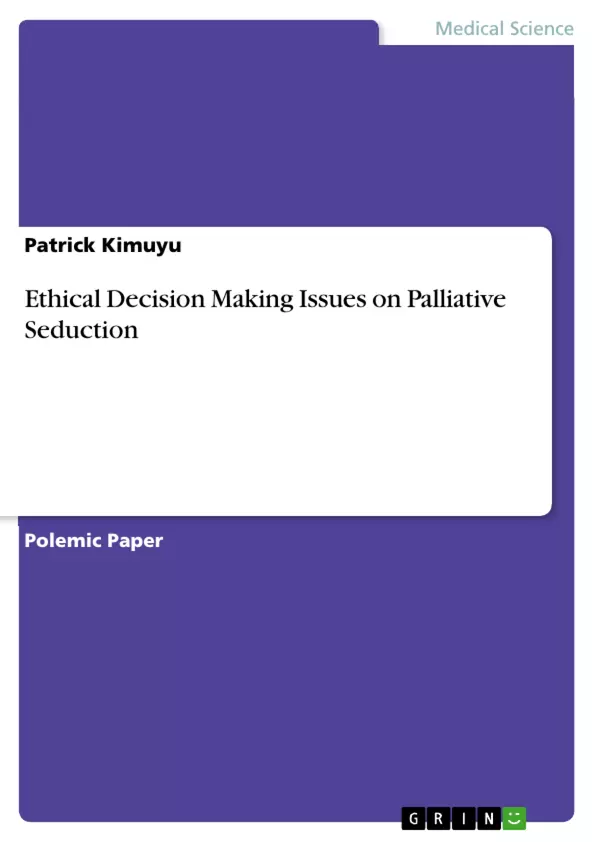This paper will provide a critical analysis of palliative seduction, especially with regard to ethical decision making in physician-assisted suicide.
It is evident that nurses play pivotal roles in the implementation of palliative seduction. Arevalo et al (2013) state “that nurses are important participants in the different phases of implementation of palliative sedation; starting with the day-to-day care of terminally ill patients and their relatives” (p. 618). Palliative seduction has become one of the most contentious ethical issues in the United States of America. Consequently, ethical decision making has also become one of the most challenging issues to baccalaureate prepared nurses and society at large. Nurses experience immense challenges while caring for patients in palliative care, especially in making end-of-life decisions. Fernandes and Moreira (2012) reaffirm the challenges faced by nurses in ethical decision making by stating that nurses “consider that end-of-life decisions, privacy, interaction between nurse/patient and/or family, team work, and access to care arise in their daily life” (p. 81). This is, probably the principal reason as to why current debate over whether palliative seduction in physician-assisted suicide should be legalized or not has evoked unprecedented controversy in the society. From a critical approach, the issue of palliative seduction has been complicated by the doctrine of double effect. However, this doctrine does not have legal, empirical and ethical relevance.
Inhaltsverzeichnis (Table of Contents)
- Introduction
- Ethical Decision Making and Palliative Seduction
- Arguments on Palliative Seduction
- Solution to Ethical Decision Making Issues on Palliative Seduction
- Conclusion
Zielsetzung und Themenschwerpunkte (Objectives and Key Themes)
This paper provides a critical analysis of palliative sedation, specifically addressing ethical decision making in physician-assisted suicide. It explores the ethical dilemmas surrounding palliative sedation, highlighting the lack of universal explanations provided by normative theories and the challenges faced by nurses in making end-of-life decisions.
- Ethical Decision Making in Palliative Sedation
- The Doctrine of Double Effect and its relevance in palliative sedation
- The Utilitarian Theory as a framework for addressing ethical challenges
- Physician-assisted suicide and its social and cultural implications
- The role of nurses in providing palliative care and navigating end-of-life decisions
Zusammenfassung der Kapitel (Chapter Summaries)
- Introduction: This chapter introduces the concept of palliative sedation and its growing importance in end-of-life care. It highlights the ethical complexities surrounding the practice, particularly in relation to physician-assisted suicide. The chapter emphasizes the challenges faced by nurses in making end-of-life decisions and the ongoing debate over the legal and ethical implications of palliative sedation.
- Ethical Decision Making and Palliative Seduction: This chapter delves into the ethical dilemmas associated with palliative sedation, focusing on the lack of universal explanations offered by normative theories. It examines the conflicting perspectives on physician-assisted suicide, highlighting the tension between medical ethics and the Hippocratic Oath. The chapter explores the three key ethical questions that arise in the debate over physician-assisted suicide, namely the right to terminate one's life, the ethics of assisting a terminally ill individual to die, and the right to decide over another's life.
- Arguments on Palliative Seduction: This chapter presents arguments for and against physician-assisted suicide, exploring the potential ethical concerns and societal implications. It discusses the risk of involuntary euthanasia, where individuals might be subjected to life-ending decisions without their consent. The chapter also examines the potential for abuse by relatives who may prioritize their own interests over the patient's wishes.
- Solution to Ethical Decision Making Issues on Palliative Seduction: This chapter proposes a solution to the ethical challenges presented by palliative sedation, advocating for the adoption of the Utilitarian theory as a framework for decision making. It emphasizes the theory's focus on maximizing overall well-being and reducing suffering, arguing that it provides a more comprehensive approach to navigating end-of-life decisions.
Schlüsselwörter (Keywords)
This paper explores the complex ethical issues surrounding palliative sedation, focusing on physician-assisted suicide. Key concepts include ethical decision making, the doctrine of double effect, the Utilitarian theory, end-of-life care, and the role of nurses in navigating these sensitive situations. The discussion highlights the challenges faced by nurses in addressing the contentious issues of death and dying, while emphasizing the need for ethical frameworks to guide their practice.
- Quote paper
- Patrick Kimuyu (Author), 2018, Ethical Decision Making Issues on Palliative Seduction, Munich, GRIN Verlag, https://www.hausarbeiten.de/document/415964


